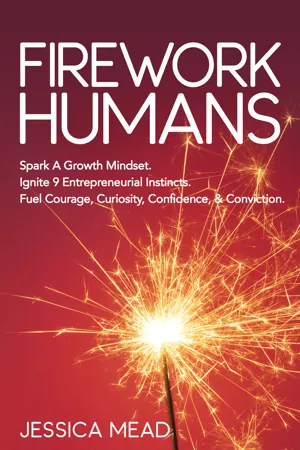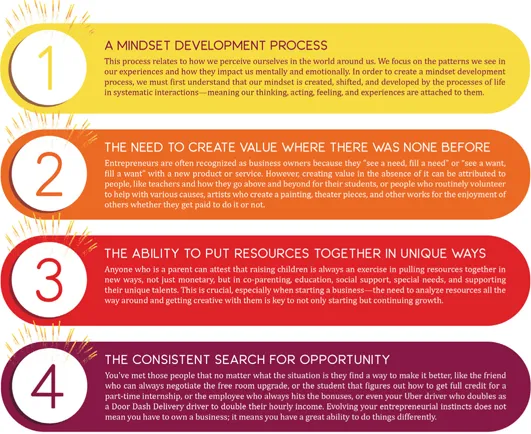![]()
PART 1
BEING A FIREWORK HUMAN
As you read this book, I encourage you to understand this: One of the greatest gifts we are given in life is the ability to transform. If we allow ourselves, we can—at any point—decide to make a change. Transformation can happen in a dramatic, sudden way or organically over time. To fight it or stay stuck or complacent is a tragedy for yourself. In the transformation or evolution of ourselves, we discover our magic, our hidden gems, and curiosity starts to bloom, and we become free to be.
In these first few chapters, I will share what I feel are foundational principles to igniting the sparks to becoming a Firework Human. Embrace new ideas, be encouraged by the familiar, and know that it’s never too late for you to spark—or be the spark in someone else’s journey!
![]()
CHAPTER 1
WE’RE ALL FUNDAMENTALLY ENTREPRENEURIAL
“The thing about growing up with Fred and George,” said Ginny thoughtfully, “is that you sort of start thinking anything’s possible if you’ve got enough nerve.”
– J.K. Rowling, Harry Potter, and the Half-Blood Prince
FIREWORK HUMANS
According to MerriamWebster.com, the definition of an entrepreneur is someone who “organizes, manages, and assumes the risks of a business or enterprise,” and that’s certainly not incorrect. But I believe being entrepreneurial at heart is so much more and encompasses so many other qualities. We’re innovative, confident, resilient, driven, and motivated. We’re life-long learners, and we’re pretty obsessed and passionate about what we do.
Entrepreneurs are a unique breed, indeed! We see a need and fill it. Or, with current consumerism as it is, “see a want, fill a want!” We get creative, think out of the box, and create solutions that not only relieve the pain points of a market but also provide income for ourselves and the team of people who want to be a part of what we’re doing. It’s a pretty cool thing.
I believe being entrepreneurial is equal to parenting. To go one step further, I believe entrepreneurialism is a fundamental human instinct, not just a type of person. Entrepreneurialism, to me, is about being able to craft your own life on your own terms using the instincts that make us creative, innovative, risk-takers—the list goes on and on. These instincts, when recognized and fostered, not only produce amazing business owners but impactful world changers in various professions and life situations.
I’ve also observed that people tend to view humans in two distinct ways—those who “are” and those who “are not” entrepreneurial. All things being equal, I believe that most people have the potential to think and act entrepreneurially whether they ever start their own business. Being entrepreneurial is not about business.
I believe there are four components that are common to entrepreneurial behavior.
These four components are found in every type of person, from artists to engineers to politicians to business owners. So, if we’re all inherently wired to be entrepreneurial, why don’t people feel they can take action and design their own life around what’s exciting and meaningful to them? The person who invented the wheel was entrepreneurial—this person saw a need to move things more easily and used basic instincts to solve the problem. We all start out with these little sparks of insight, these instincts that we don’t quite know what to do with. Curiosity pushes us to explore them, stretching the boundaries of our expectations.
Humans who tap into their growth mindset and entrepreneurial instincts learn how to do things that others simply do not. The sooner a human believes that anything is possible if you try, try harder, and try again, the more rapidly these sparks develop into a vision for the future, and that’s where things get exciting. Upbringing, social interactions, exposure to education, training, and background experiences can speed up or slow down the development of your entrepreneurial instincts. And just like peanuts (some people are allergic, and others are not), growing up poor does not dictate success or failure. Clearly, relationships and distinctive cultural, economic, political, religious, and technological factors all play a part in mindset and how strongly developed these instincts become. If we’re encouraged and mentored to explore and develop our instincts, we can turn instincts into behavior traits and master our mindset. This is how parents can raise cool, firework humans, how leaders can develop their teams, and how life partners can grow together. It’s how we make every trip around the sun count—in a big way.
A SHIFT IN EDUCATION MINDSET = SUCCESS
The Near Disaster
A business associate of mine had two children—one in kindergarten, one in second grade. The second-grade teacher kept saying that the child was not where he needed to be and was going to have him tested for learning disabilities. The parents disagreed with that cookie-cutter approach and pulled him out of school. They decided to homeschool him and tested him on their own. It was no surprise to them that he had no learning disability. The class was simply moving too quickly, and the approach to reading was just not what he needed.
The parents freaked out because they felt ill-equipped to educate their child. For the last two months of the year, they put the child back in private school. The child was having the same issues they had at the first school. Over summer, they decided they were going to tighten up on the reading comprehension (the child was struggling with his reading and understanding what he read or attaching it to things he already knew). In doing this, they now believed they could educate their child. When the next school year started, he had progressed several reading levels and was teaching his younger sibling to read. After they researched homeschooling a bit better and figured out what would work best for their child, they pulled both children out of school, and that’s where they began their homeschool journey. Now, one child is 19 and has two years of college under his belt; the other child is 17 and has already earned a year’s worth of college credits. As leaders, business owners, and even parents, we have to make sure that we are viewing other humans and situations with a growth mindset and a focus on how to develop people’s individual success traits (those sparks inside them that need igniting.)
If you know your child is intelligent, driven, and resourceful, but only when they’re interested in the subject—you already know they think differently. And that’s okay! As a parent, we must look at the individual child and determine what ignites their courage curiosity, confidence, and conviction. We must think about how they can incorporate those interests in other areas that they aren’t as interested in. And most importantly, we must investigate what is making them think (and behave) differently, analyze their motivation, and know when to encourage their excitement and when to redirect it. The same is true about the teams we build, the partners we curate, and the vendors we collaborate with within our professional lives.
Remember, just like there are many employee assessments and employee rewards programs to choose from, there are also many educational paths you can put your child on, including traditional (public), private, charter, homeschooling, and hybrid models, as well as supplemental. A personal relationship is no different. Firework humans, growth mindset, and encouraging the 9 entrepreneurial Instincts is a concept you can put into play for your spouse, partner, family, and business associates. Looking into the information in the next few chapters will help you better connect with the humans in your life and help you understand how to guide, support, and ignite their ability to become Firework Humans.
IGNITING ENTREPRENEURIAL INSTINCTS
As the CEO of BrandLync (a full-service digital marketing agency) and several other companies, I have worked with hundreds of employees at every level of experience, socio-economic background, and educational level. I’ve tested everything I’ve learned over the last 15 years about homeschooling, learning styles, teaching styles, and motivating kids to expand their limits and become risk-takers on my employees.
Let’s look at a normal day at BrandLync, a company that promotes a growth mindset. Managers and team leads will be checking in and communicating with team members, encouraging the effort and progress forward, not staying in their office or workspace without interaction. You will find people seeking guidance or collaboration on problems. Team members are refreshing their knowledge of products and procedures and learning about other areas of the company. There is a sense of responsibility and accountability in the air. The environment feels alive—it’s not a stagnant workspace. Employees can visualize their potential to grow, learn, and thrive within that company. And because of this, they feel more committed to their work.
While the responsibility lies with the CEO (ME) to set up the right environment for the growth mindset employee to thrive, make no mistake that fixed mindset employees will be challenged to succeed in this culture. My best business advice is to discover how you, the business owner, can create a growth culture and spark the growth mindset in employees that didn’t grow up with it. Through the dozens of companies and hundreds of employees that my husband and business partner, Matt, and I have had over the last 22 years, we have learned that approaching our businesses with this mindset is far more effective and impactful.
Over the next several chapters, I’ll talk more about a growth mindset and how to develop the entrepreneurial instincts in both your children and your employees. Sometimes, the methods are the same, while other times, they will be different. (After all, your employees aren’t eight-year-olds.) At my website, JessicaMead.com, you’ll find all sorts of resources you can use with your children and your employees. You can unlock these resources by going to the Member Log-In and using the password: StillOrbiting.
CHAPTER 1
REVIEW & REFLECT
REVIEW:
- Entrepreneurialism is a fundamental human instinct.
- The four components of entrepreneurial behavior are: a) mindset, b) the ability to create value, c) the ability to put resources together in unique ways, d) and a consistent search for opportunity.
- Entrepreneurial instincts and growth mindsets can be developed in both your children and your employees.
REFLECT:
- What are my entrepreneurial qualities?
- Do I recognize them in others?
- Am I willing to make changes necessary to nurture the growth mindset and entrepreneurial instincts in both my family and team members?
![]()
CHAPTER 2
SPARKING THE FLAME OF THE GROWTH MINDSET
There’s something that every human needs to believe with every cell in their bodies. When they do, they will thrive. Period. Your brain grows stronger—exponentially so—with time put in and continuous effort.
Oh, if humans could only grasp this fully. Some do, and they do thrive. Others, whether consciously or subconsciously, don’t believe this to be accurate and don’t fully become all they could. And so many times, I think it comes down to one’s mindset. The idea that people may have one of two mindsets was proposed by Carol Dweck.1 a psychology professor at Stanford. Her work identified that “People adopt one of two types of mindsets: “fixed” and “growth.” In a fixed mindset, people believe their basic qualities, like their intelligence or talents, are simply fixed traits. They believe that talent alone creates success. Whereas people with a more persistent growth mindset believe that they can substantially change their intelligence and personality with effort.”
A growth mindset fosters motivation, resilience, and persistence. A fixed mindset kills it. Some humans believe that their mental capacity to learn things is not as strong as those people who were simply “born smarter.” This belief leads them to give up quicker, believing that if they can’t do something, it’s because they aren’t smart enough, creative enough, fair enough, or whatever enough. Humans who have a growth mindset are more likely to keep working hard toward a goal, believing that all that stands between them and success is the right amount of effort. A growth mindset moves both education and business forward and positions them for more growth, profit, and success in the future. So how do all of these puzzle pieces fit together?
From a business perspective, it starts with how I conduct the first job interview, to employee reviews, the company culture, and compensation plans. My mission is to ignite their entrepreneurial instincts and help them develop more courage, curiosity, confidence, and conviction. It has made all the difference in my business’s success and the satisfaction of my team’s work-life—they’re not my kids, but they are my work family. As the architect and leader, I understand that it is my job to invest in everyone’s success and growth. This belief is in keeping with my motivation to continually evolve, seek knowledge, and lead by example. From a parenting perspective, I’ve taken years to understand my children’s learning style and motivation and crafted outside-of-the-box education plans that allow them to thrive without worrying about a “normal education.”
A growth mindset moves both education an...




